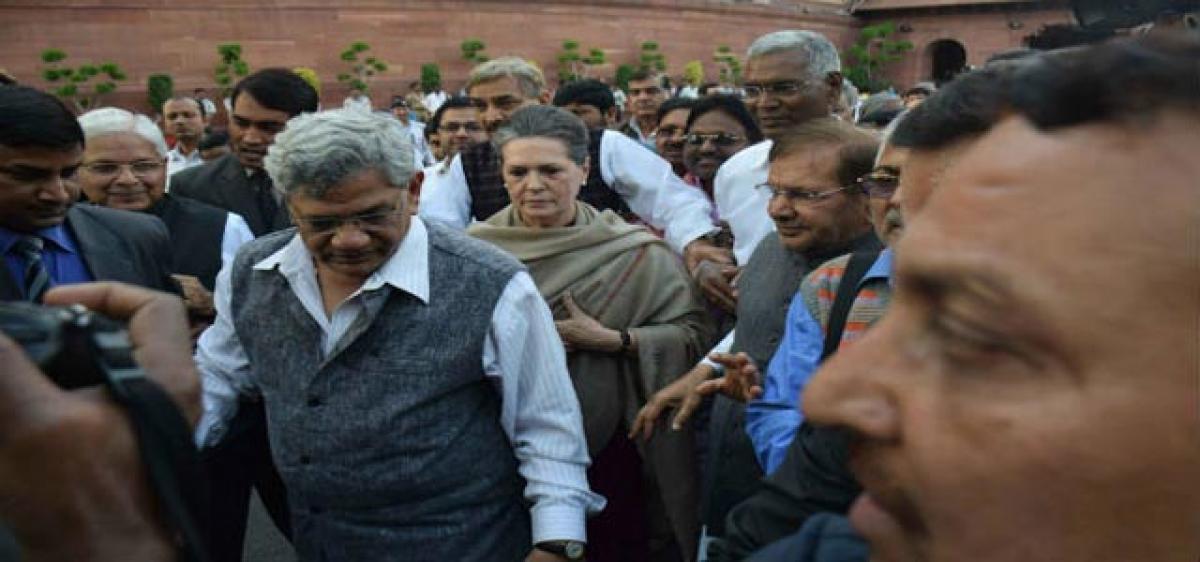Live
- Over 7,600 Syrians return from Turkiye in five days after Assad's downfall: minister
- Delhi BJP leaders stay overnight in 1,194 slum clusters
- Keerthy Suresh and Anthony Thattil Tie the Knot in a Christian Ceremony
- AAP, BJP making false promises to slum dwellers for votes: Delhi Congress
- 'Vere Level Office' Review: A Refreshing Take on Corporate Life with Humor and Heart
- Libya's oil company declares force majeure at key refinery following clashes
- Illegal Rohingyas: BJP seeks Assembly session to implement NRC in Delhi
- Philippines orders full evacuation amid possible volcanic re-eruption
- Government Prioritizes Welfare of the Poor, says Dola Sri Bala Veeranjaneyaswamy
- Two Russian oil tankers with 29 on board damaged due to bad weather
Just In

The Narendra Modi government came under increasing attack by opposition parties through the year over a range of issues, including demonetisation,
The Narendra Modi government came under increasing attack by opposition parties through the year over a range of issues, including demonetisation, but larger opposition unity remained elusive due to the competing interests of political outfits opposed to the ruling BJP-led alliance. The year also saw the Bharatiya Janata Party (BJP) regaining its electoral momentum after its emphatic victory in the Assam assembly polls and the main opposition Congress unable to halt its downslide as it lost power in Assam and Kerala.
Demonetisation of Rs 1,000 and Rs 500 notes, suddenly effected by Prime Minister Narendra Modi on November 8, emerged as the biggest political issue of the year with opposition parties vigorously focusing on the plight of people forced to stand in unending queues to withdraw their own money. Opposition parties also found an issue to personally target Modi and sought an inquiry into allegations that he received money from the Sahara and Birla corporate houses when he was Chief Minister of Gujarat.
Demonetisation is set to be a key issue in the forthcoming assembly elections in five states, with people, specially the poor and middle classes, expecting tangible results from the massive exercise that forced them to endure hardships in getting cash and also affected jobs and businesses.
Both the opposition parties and the government have been using demonetisation to rally people behind them. With the responsibility of delivering results squarely on his shoulders, Modi, in his speeches, has been seeking support by terming demonetisation as a struggle of the honest tax-paying citizens against unscrupulous elements out to usurp money meant for the welfare of the poor.
There was no effective debate on demonetisation during the winter session of parliament but several opposition parties came together to target the government on its impact on the people, the frequent change in rules and "shifting goalposts". But the unity was not visible outside due to competing interests of parties ahead of assembly polls in Uttar Pradesh, Punjab, Uttarakhand, Manipur and Goa.
Even as they targeted the government on demonetisation, there was no unanimity in the demands of opposition parties. Janata Dal-United (JD-U) leader and Bihar Chief Minister Nitish Kumar as also Biju Janata Dal leader and Odisha Chief Minister Naveen Patnaik welcomed demonetisation. Also, despite demonetisation affecting people in every nook and corner of the country, the opposition could not stage a mass nationwide protest.
The Left parties, JD-U, Samajwadi Party, Bahujan Samaj Party and Nationalist Congress Party did not attend a meeting called by the Congress to target the Prime Minister over demonetisation and the Birla and Sahara papers. The BJP, which lost the assembly polls in Delhi and Bihar in 2015 but regained its momentum, also performed credibly in civic election polls held during the year in some states. Much is at stake for the BJP in the assembly polls in the five states, particularly Uttar Pradesh, which sends the largest number of parliamentarians to the Lok Sabha and the Rajya Sabha.
The year also saw opposition parties finding a slew of issues to target the Modi government including the unrest in Jammu and Kashmir, "failure" of ruling alliance's Pakistan policy, arrest of Jawaharlal Nehru University student leader Kanhaiya Kumar, suicide of Hyderabad University student Rohith Vemula, the Centre's action in relation to the assemblies of Uttarakhand and Arunachal Pradesh and the "politicisation" of surgical strikes carried out on terror launch pads across the Line of Control in Kashmir.
Political analyst and senior journalist Kuldip Nayar He said opposition parties can come together in future on a common minimum programme but there is no indication of this happening as yet.
By Prashant Sood

© 2024 Hyderabad Media House Limited/The Hans India. All rights reserved. Powered by hocalwire.com







